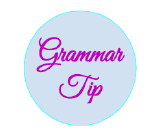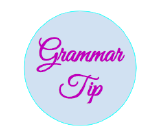8.1: Verb Forms
- Page ID
- 36320
Verb Forms

You must always use a verb in every sentence you write. Verbs are parts of speech that indicate actions or states of being. The most basic sentence structure is a subject followed by a verb. Correct use of verb tenses and forms is very important in English. Verbs carry much of the main meaning of the sentence, and verb suffixes and auxiliaries indicate the time. Verbs are the powerhouses of our language.
There are two main types of verb errors. Try to distinguish between the two types.
Verb Form is an error where the tense has been incorrectly formed. Verb Tense is an error where an incorrect tense has been chosen for the meaning. Although the grammar of verbs is very complex in English, every student can easily learn the basic grammar and be able to use verbs correctly.
English verbs have five forms:
|
Base |
Past |
Past Participle |
Progressive/Continuous |
3rd Person Singular |
|---|---|---|---|---|
| Regular WALK |
WALKED | WALKED | WALKING | WALKS |
| Irregular EAT |
ATE | EATEN | EATING | EATS |
Some Verb Form Rules to Know
|
Verb Form Rules |
Examples |
|---|---|
|
Infinitive = to + base form |
to run, to hide, to show |
|
Modal = modal + base form |
can run, could hide, should show |
|
Do Support = do, does, did + base form |
did run, doesn't hide, did show |
|
Progressive = "to be" + base + ing |
am running, was hiding, are doing |
|
Perfect = have, has, had + past participle |
have run, has hidden, had shown |
|
Passive = "to be" + past participle |
is built, was written, are being done |
Active Forms of the 12 English Tenses of the regular verb "WALK"
| Past | Present | Future | |
|---|---|---|---|
|
SIMPLE |
WALKED |
WALK/S |
WILL WALK |
|
PROGRESSIVE |
WAS /WERE WALKING |
AM/IS/ARE WALKING |
WILL BE WALKING |
|
PERFECT |
HAD WALKED |
HAS/HAVE WALKED |
WILL HAVE WALKED |
|
PERFECT-PROGRESSIVE |
HAD BEEN WALKING |
HAS/HAVE BEEN WALKING |
WILL HAVE BEEN WALKING |
Simple Verbs

Simple Verb Tenses
Verb tenses tell the reader when the action takes place. The action could be in the past, present, or future. These are called Time Frames.
| Past | ←Present→ | Future |
|---|---|---|
|
Yesterday I jumped. |
Today I jump. |
Tomorrow I will jump. |
Simple Present Verbs
Simple present verbs are used in the following situations:
When the action takes place now.
Example: I drink the water greedily.
When the action is something that happens regularly.
Example: I always cross my fingers for good luck.
When describing things that are generally true.
Example: College tuition is very costly.
 When it is he, she, or it doing the present tense action, remember to add -s, or -es to the end of the verb; or to change the y to -ies.
When it is he, she, or it doing the present tense action, remember to add -s, or -es to the end of the verb; or to change the y to -ies.
Simple Past Verbs
Simple past verbs are used when the action has already taken place and is now finished:
- I washed my uniform last night.
- I asked for more pie.
- I coughed loudly last night.
 When the action is something done in the past, remember to add -d or -ed to the end of regular verbs, regardless of the subject.
When the action is something done in the past, remember to add -d or -ed to the end of regular verbs, regardless of the subject.
Simple Future Verbs
Simple future verbs are used when the action has not yet taken place:
- I will work late tomorrow.
- I will kiss my boyfriend when I see him.
- I will erase the board after class.
 "Going to" can also be added to the main verb to make it future tense: I am going to go to work tomorrow.
"Going to" can also be added to the main verb to make it future tense: I am going to go to work tomorrow.
Exercise: Simple Verbs

Complete the following sentences by choosing the correct verb in the simple tense:
- Please do not (erase, erased, will erase) what I have written on the board.
- They (dance, danced, will dance) for hours after the party was over.
- Harrison (wash, washed, will wash) his laundry after several weeks had passed.
- Yesterday Mom (ask, asked, will ask) me about my plans for college.
- I (bake, baked, will bake) several dozen cookies for tomorrow's bake sale.
 If you have a compound subject like Marie and Jennifer, think of the subject as "they" to determine the correct verb form: Marie and Jennifer (they) have a house on Bainbridge Island.
If you have a compound subject like Marie and Jennifer, think of the subject as "they" to determine the correct verb form: Marie and Jennifer (they) have a house on Bainbridge Island.
Similarly, single names can be thought of as he, she, or it: LeBron (he) has scored thirty points so far.

